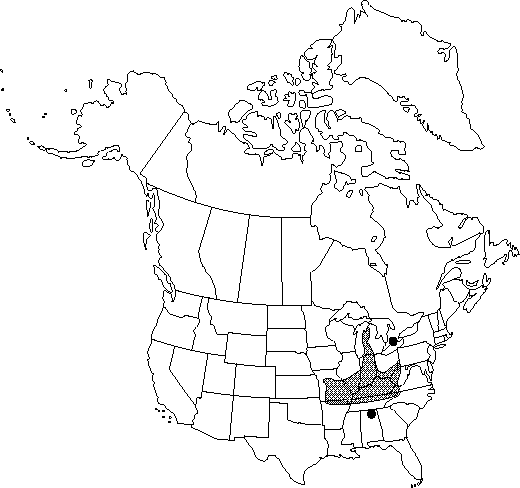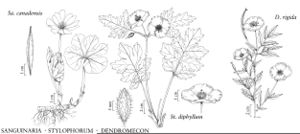Difference between revisions of "Stylophorum diphyllum"
Gen. N. Amer. Pl. 2: 7. 1818.
FNA>Volume Importer |
imported>Volume Importer |
||
| (2 intermediate revisions by 2 users not shown) | |||
| Line 64: | Line 64: | ||
|publication year=1818 | |publication year=1818 | ||
|special status=Endemic;Illustrated | |special status=Endemic;Illustrated | ||
| − | |source xml=https:// | + | |source xml=https://bitbucket.org/aafc-mbb/fna-data-curation/src/2e0870ddd59836b60bcf96646a41e87ea5a5943a/coarse_grained_fna_xml/V3/V3_721.xml |
|genus=Stylophorum | |genus=Stylophorum | ||
|species=Stylophorum diphyllum | |species=Stylophorum diphyllum | ||
Latest revision as of 21:51, 5 November 2020
Plants to 5 dm, downy. Stems simple or branching. Leaves to 5 dm; petiole to 2 dm; blade pale abaxially, deeply 5-7-lobed; margins irregularly dentate or crenate. Flowers: pedicels 25-80 mm; sepals ca. 15 mm; petals yellow, obovate, 2-3 cm wide; style 3-6 mm. Capsules ellipsoid, 20-35 mm, pubescent. Seeds pale brown, reticulate-pitted. 2n = 20 (cult.).
Phenology: Flowering spring.
Habitat: Moist deciduous woods, thickets, and cedar barrens, often on slopes, occasionally in fields or on shaded dunes, in loam or sand
Elevation: 100-600 m
Distribution

Ont., Ala., Ark., Ill., Ind., Ky., Mich., Mo., Ohio, Tenn., Va., W.Va.
Discussion
Vegetatively, this native species closely resembles the more frequent and widespread Chelidonium majus, introduced from Eurasia. Various authors have reported Stylophorum diphyllum from western Pennsylvania, but W. E. Buker and S. A. Thompson (1986) could not confirm its past or current native presence there.
Selected References
None.
